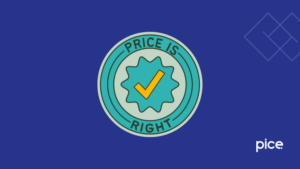Tours and Travels GST Rate: ITC, Rules & Guide
- 5 Nov 25
- 9 mins
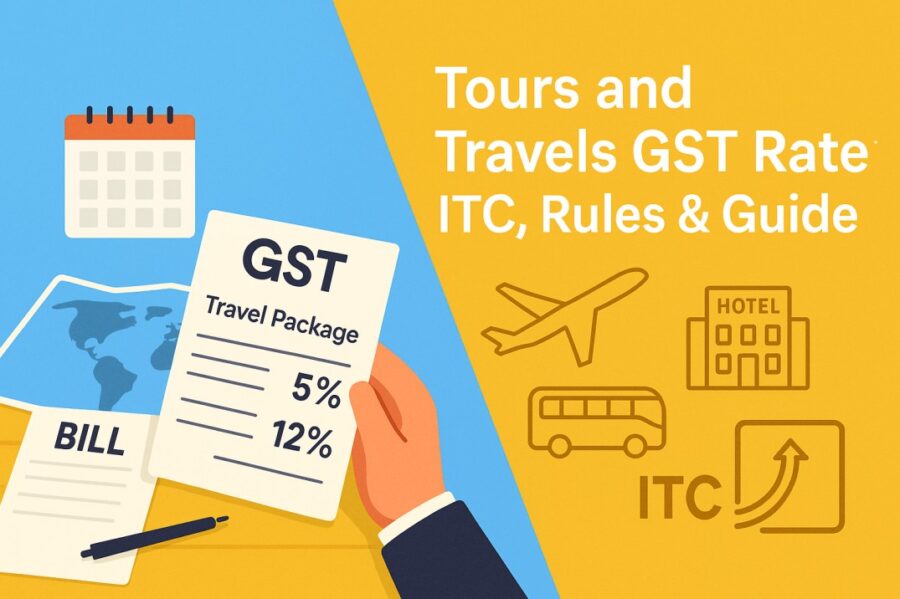
Tours and Travels GST Rate: ITC, Rules & Guide
- Scope of GST for Tours and Travels
- GST Rates and SAC Codes for Various Tour and Travel Services
- How to Determine the Place of Supply for a Tour Company?
- When Does GST Apply to Tours and Travels?
- Can You Claim on GST for Tours and Travels?
- What is the Difference Between Tour Operators and Travel Agents?
- Conclusion
Key Takeaways
- Tours and Travels GST rate is 5% without ITC and 18% with ITC, depending on the operator’s tax preference.
- Tour operators can claim ITC only if they charge 18% GST, helping reduce overall business tax liability.
- Place of supply under GST varies — for hotels, it’s the property location; for flights, it’s the departure point.
- Travel agents pay GST only on commission income, not on the total value of the travel package sold.
- Overseas tour packages attract TCS and GST, making compliance and accurate invoicing crucial for travel businesses.
The tours and travels GST rate is now decided based on the availability of input tax credits (ITC). If a tour operator decides not to claim ITC, then a 5% GST is levied on their gross tour expenses.
Whereas, for those opting for ITC, the Government applies an 18% GST rate. These different GST rates have a significant impact on the tariffs sent to the travellers.
To learn more about how the supply values are calculated while determining the GST for tour packages, continue reading.
Scope of GST for Tours and Travels
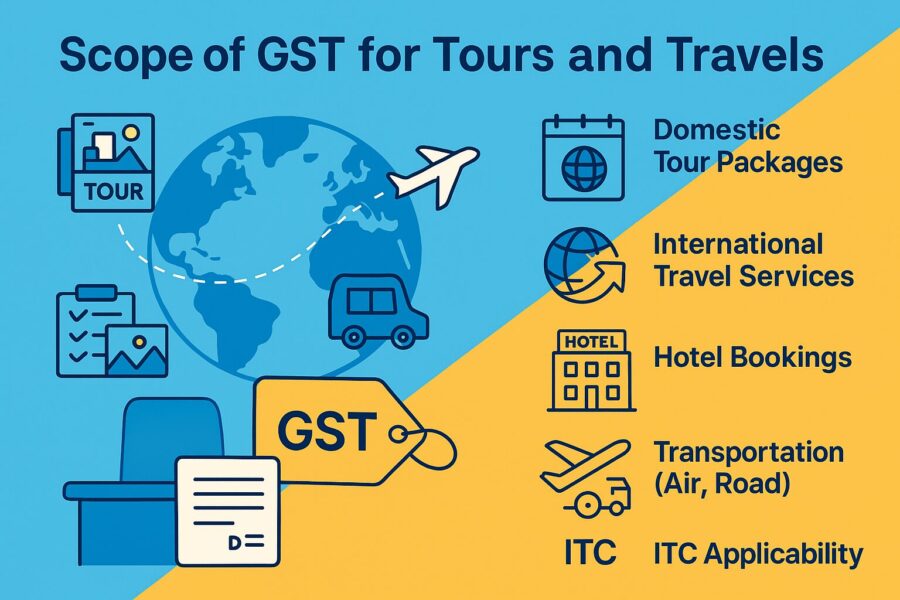
The Goods and Services Tax (GST) Act allows tour operators in India three distinct ways to legally operate their business and claim ITC. Under GST, the input tax credit is normally the taxation amount that companies may deduct from their overall due tax upon purchasing supplies for the furtherance of business.
Here’s how you can run a business as a tour operator in India:
- As a company with no ITC: If you select this method, you will be liable to charge a flat 5% GST on the total bill. In return, you won’t be eligible to get any ITC.
- As a travel company with ITC: Under this scheme, you can claim 18% GST on your customers’ bills and claim ITC. However, it is important to note the place of supply while applying ITC.
- As a pure agent: In this last method, an 18% tours and travels GST rate applies while you decide to function as an intermediary. Here, you act as a facilitator, with actual costs for services such as travel, hotel and boarding itemised separately on the invoice and reimbursed by the customer.
Note: Any tour operator with an annual turnover exceeding ₹20 lakh (₹10 lakh for special category states) must register for GST.
GST Rates and SAC Codes for Various Tour and Travel Services
According to Heading 9985 of the GST Tariff Act, a company can charge a 5% tours and travels GST rate on services upon meeting the following conditions:
The tour operator cannot claim ITC on services such as air ticket, hotel booking, etc. However, they can still claim ITC on services taken from another travel company.
It is mandatory to declare that the charged amount is the total or gross amount in the tour operator’s invoice. The invoice should show all the charges for transportation and accommodation.
Below, you see a tabular list of service-related GST for tour packages along with SAC codes for some core services:
| Service Description | SAC | GST Rate |
|---|---|---|
| Services provided to a foreign tourist by an Indian tour operator related to a travel package involving places outside India | 9985 | 0% (Nil) |
| Sale of tour packages | 998552 | 5% |
| Air ticket booking service through agents | 998551 | 18% |
| Service charge applicable on tour services, such as Passport issuance, Visa, etc. | 998555 | 18% |
| Rail travel agent commission | 9967 | 18% |
| Cruise/ hotel booking by a travel agent | 998552 | Varies between 2% - 18% when ITC is claimed. Otherwise, it is 5%. |
| Cab rental service | 9967 | 5% |
| Other rental services | 998559 | 18% |
Determining the Value of Supply for GST on Tours and Travels
When a travel company functions like a pure agent, it can easily eliminate the costs incurred by another service provider from the overall value of its taxable supply. It will facilitate more precise tax calculation and make sure that the government collects tax from the rightful entity, in this case, the pure agent.
How to Determine the Place of Supply for a Tour Company?
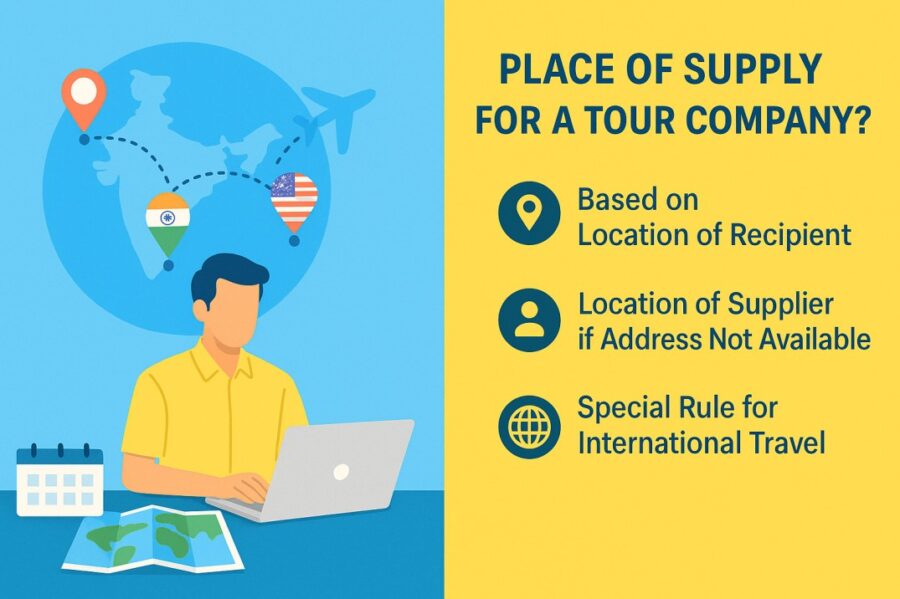
Starting October 1, 2023, companies selling overseas tour packages were required to collect a 5% Tax Collected at Source (TCS) on payments up to ₹7 lakh per individual annually, and a hefty 20% on any amounts exceeding that.
It is a crucial reform for agents charging GST on international tour packages, as following this new rule will help them stay compliant, steer clear of penalties and keep customers well-informed about any extra costs.
In general, while making hotel bookings, the place of supply is automatically the location where the accommodation is situated. Similarly, for flights, the place of supply is the location of departure. If a company is not officially GST-registered in the state from which the plane is departing, it cannot claim ITC on its invoice.
When Does GST Apply to Tours and Travels?
The determination of the time of supply, much like the value of supply, is dependent on whether a tour service provider is operating as a pure agent.
If the company is not working as a pure agent, its customers will have to pay the GST amount while making payments or at the time the invoice is raised, whichever happens first. During these situations, the GST for tours and travels is recognised on a payment basis.
On the other hand, if a pure agent is involved, the GST component is added while making the final invoice or receiving the commission, whichever occurs first.
Can You Claim on GST for Tours and Travels?
Suppose you own a tour agency and you decide to charge an 18% GST rate on the gross invoice amount. Then, you can claim input tax credit on different services like professional fees, rent, telephone, etc.
In the pointers below, you will find more information regarding ITC availability on GST for tour packages:
- Air ticket booking companies can impose ITC to recover the paid GST for service charges or commission.
- Next, inbound tour charges on commission are subject to 18% taxation with ITC.
- Hotels receiving commission income will apply 18% GST and thus they can claim ITC.
- ITC can be charged if you outsource the tourism service from another agent or service provider.
- Finally, all additional renting solutions attract an 18% GST, with ITC.
What is the Difference Between Tour Operators and Travel Agents?
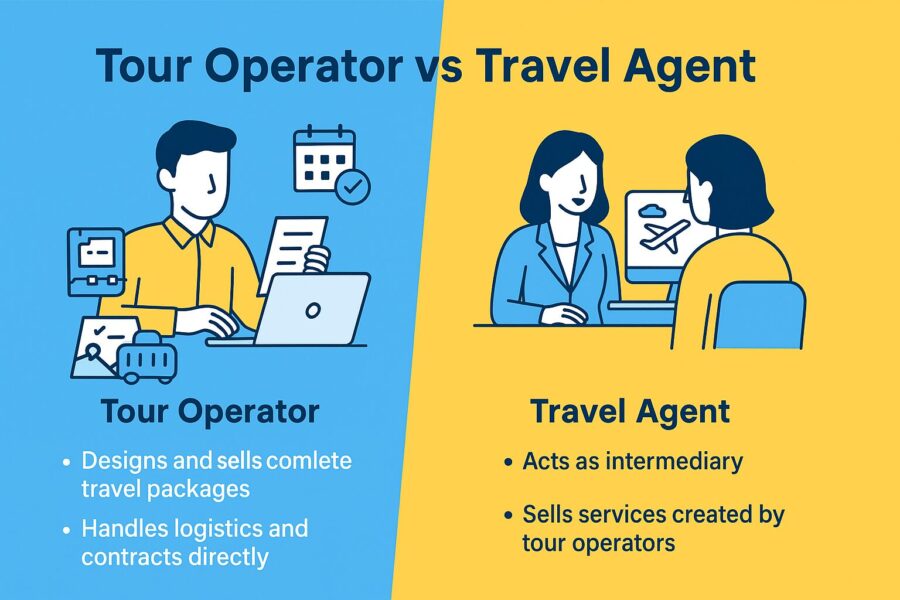
Take a look at the following table to find out the key differences between tour operators and travel agents and determine the GST implications:
| Parameters | Tour Operator | Travel Agent |
|---|---|---|
| Meaning | A tour operator is a company or individual responsible for planning and managing holiday packages. | A travel agent is an intermediary or agency that sells vacation packages and travel services on behalf of tour operators. |
| Purpose | They arrange travel services. | Travel agents purchase the ready-made holiday packages and offer them to travellers. |
| Service | They make sure everything in the holiday package runs smoothly once it is booked. | They help you choose the right holiday and handle the booking based on what you are looking for. |
Key Points to Note While the Applying Tours and Travels GST Rate
When applying GST rates to tours and travel services, it is important to understand how different components are taxed. Here are a few key pointers that one must note in this case:
- When a travel package bundles services like transport, stay and more into one offering, GST is usually applied to the net service fee charged by the tour operator. In most cases, the applicable GST rate remains around 18%
- Different parts of a travel package can attract different GST rates. For example, certain services within the package might be taxed at a lower rate or even be exempt. That’s why it is essential to clearly break down and classify each component to ensure accurate GST compliance.
- In the case of travel agents, GST is charged only on the commission they earn, not on the total value of the travel package sold.
- Travel agents are eligible to claim ITC on the GST paid for business-related expenses such as the office rent, phone and internet bills, booking software, etc
Conclusion
Charging the correct GST rate and claiming ITC on eligible purchases can have a huge impact on your tour package pricing and profitability. If you are unsure about the tours and travels GST rate, you can refer to the table provided above.
However, if there emerges a complexity due to the multiple sources of income involved, you can consult a GST expert online for the most optimal solution.
💡If you want to streamline your payment and make GST payments via credit, debit card or UPI, consider using the PICE App. Explore the PICE App today and take your business to new heights.
 By
By 









